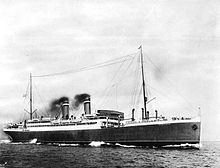By William G. Foss
Cleaning out closets is not a job I relish, especially when most of my closets resemble those owned by the famed closet stuffer, Fibber McGee. Since I had procrastinated to the nth degree – it could no longer be put off –I decided to tackle the easiest job first, the closet filled with boxes of scrapbooks and Christmas cards received years ago, stacks of 78 rpm phonograph records, a pile of misplaced and forgotten book, family games (who plays Chinese checkers these days?), large manila envelopes filled with who knows what, and umpteen photo albums.
While I began my cleaning job with great enthusiasm, the task of removing items from the shelves and placing them in an orderly fashion on the floor, soon became a bore. So I decided to take a rest and browse through the old photo albums. One small album contained photographs of an important part of my life: leaving Norway to be reunited with my father in America.
My father, Hans Fosshaug, the son of Otto and Hilda Fosshaug in the town of Hyggen on the Drammensfjord, had immigrated to the United States in the early 1900s. He later dropped the “haug” in the family name claiming that Americans couldn’t pronounce “haug” correctly. Living in Boston, he met and married another Norwegian immigrant, Alma Sandstrom, from Oslo, and I was the sole offspring of their union.
After the death of my mother when I was about two or three years old my father returned to Norway where he placed me in the care of his parents. He apparently felt that bringing up a child by himself was too much of a burden for a young man trying to make a life for himself in the New World.
In Hyggen, where the cool blue water of the Drammensfjord touches its bay surrounded by rolling hills and majestic woods, my grandparents gave me their love and raised me as their son. I called them “far” and “mor”, the Norwegian words for father and mother, not “bestefar” and “bestemor”, grandfather and grandmother.
A once in a while Amerikabrev – letter from America – would arrive to tell my grandparents of my father’s goings and doings. Occasionally they would include a communication to his son. Once my father sent me a baseball bat. Nobody in Hyggen knew what it was used for. I can remember using it just to bang things, break small tree branches and hit rocks into Hyggen Bay.
Following graduation from the Hyggen Folkeskole (elementary school) and confirmation at the Royken church it was decided that William should join his father in America. So, one sunny day in June 1933 at the age of 14, I found myself in Oslo boarding the SS Bergensfjord, one of the great ships of the Norwegian America Line, for an ocean crossing to New York and a journey into an uncertain future. Suddenly, I who had never been outside the town of Hyggen without being accompanied by grownups, found myself alone in a strange and complex environment. While I was apprehensive, I also looked forward to meeting the new challenges and experiences that lay ahead.
I was concerned how I would react when would finally meet the father who I didn’t remember. Since he had remarried, I now had a stepmother. And, a sister.
Then there was the language problem. I didn’t know a word of English, except the words, “Made in USA”, labeled on goods from America. Two much traveled passengers, Louis Hansen and Lars Tobiassen, became my shipboard guardians and upon learning of my language problem began an intensive English tutoring program. They were determined that I should at least learn how to say some basic everyday American phrases. I caught on pretty well and when we entered New York harbor I was certain that I could say, “How do you do, Father”, in perfect English.
Pandemonium seemed to break out when the Bergensfjord docked in New York. People were stirring about everywhere and yelling happily at each other. Having said goodbye to my newfound friends, I stood by the ships railing to await the arrival of my father.
Soon I saw him coming on board. He looked much like the pictures he had sent me of himself. I remembered the words that my two mentors had taught me, “How do you do, Father.”
He came towards me. We embraced.
I said, “Far.”
“William.” he said.
There was a long silence.
“Let’s go home,” my father said.
And, that’s how it was when I came to America.
Oh, you’re wondering about the closet? Except for the books, everything else went back to where they had been stored before.
William Foss
813 Queen Elizabeth St.
Virginia Beach, VA
May 21, 1999

